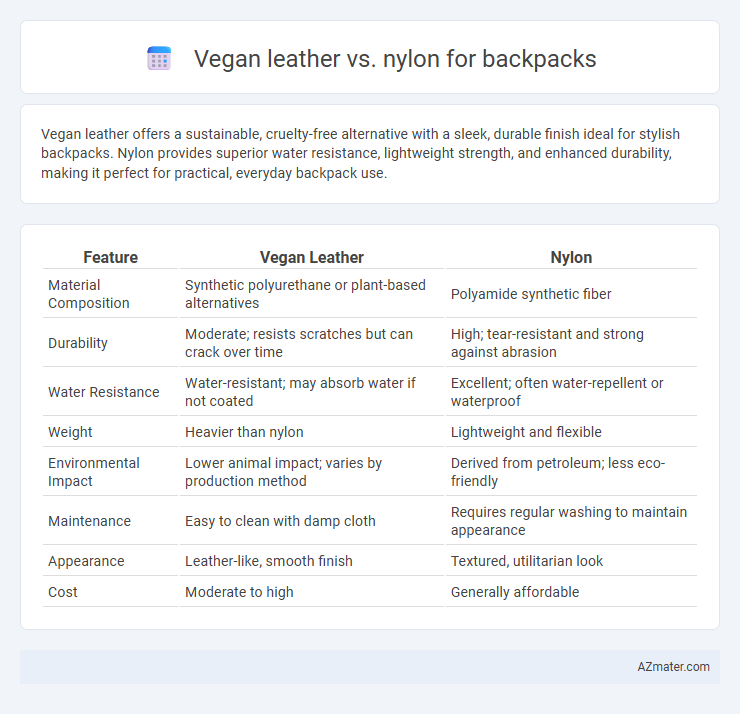Vegan leather offers a sustainable, cruelty-free alternative with a sleek, durable finish ideal for stylish backpacks. Nylon provides superior water resistance, lightweight strength, and enhanced durability, making it perfect for practical, everyday backpack use.
Table of Comparison
| Feature | Vegan Leather | Nylon |
|---|---|---|
| Material Composition | Synthetic polyurethane or plant-based alternatives | Polyamide synthetic fiber |
| Durability | Moderate; resists scratches but can crack over time | High; tear-resistant and strong against abrasion |
| Water Resistance | Water-resistant; may absorb water if not coated | Excellent; often water-repellent or waterproof |
| Weight | Heavier than nylon | Lightweight and flexible |
| Environmental Impact | Lower animal impact; varies by production method | Derived from petroleum; less eco-friendly |
| Maintenance | Easy to clean with damp cloth | Requires regular washing to maintain appearance |
| Appearance | Leather-like, smooth finish | Textured, utilitarian look |
| Cost | Moderate to high | Generally affordable |
Introduction: Vegan Leather vs Nylon Backpacks
Vegan leather backpacks offer an eco-friendly alternative to traditional materials, combining style with cruelty-free production. Nylon backpacks provide exceptional durability, water resistance, and lightweight comfort, making them ideal for daily use and outdoor activities. Choosing between vegan leather and nylon depends on preferences for sustainability, aesthetics, and functional performance.
Material Composition and Sustainability
Vegan leather for backpacks, typically made from polyurethane (PU) or plant-based materials like cork and apple peels, offers a cruelty-free alternative to animal leather with moderate durability and water resistance. Nylon, a synthetic polymer derived from petrochemicals, provides superior strength and lightweight properties but has a higher environmental impact due to fossil fuel dependency and limited biodegradability. From a sustainability perspective, plant-based vegan leather variants have a lower carbon footprint and reduced chemical use compared to nylon, which often relies on fossil fuels and generates microplastic pollution.
Durability and Longevity Comparison
Vegan leather offers a stylish, water-resistant finish but generally lacks the abrasion resistance and flexibility of nylon, which excels in durability and longevity under heavy use. High-denier nylon fabrics, such as 1680D ballistic nylon, provide superior tear resistance and weatherproof qualities that extend backpack lifespan significantly. While vegan leather backpacks may show wear faster, nylon options maintain structural integrity longer, ideal for rugged or daily-use scenarios.
Water Resistance Capabilities
Vegan leather typically offers moderate water resistance due to its synthetic composition but can absorb water over time, potentially leading to damage or stains. Nylon excels in water resistance with its tightly woven fibers and often features water-repellent coatings, making it highly effective in repelling water and quick drying. For backpacks prioritizing durability in wet conditions, nylon provides superior moisture protection compared to vegan leather.
Weight and Comfort Considerations
Vegan leather backpacks typically weigh more than nylon ones due to the dense, synthetic materials used in their construction, impacting overall comfort during prolonged use. Nylon is renowned for being lightweight and breathable, which enhances comfort and reduces strain on the shoulders, especially during extended wear. Choosing between vegan leather and nylon depends on balancing aesthetic preferences with the need for a lighter, more comfortable backpack experience.
Style and Aesthetic Options
Vegan leather backpacks offer a sleek, sophisticated appearance with a matte or glossy finish that mimics traditional leather, appealing to those seeking a modern yet classic style. Nylon backpacks provide a sporty, casual look with a variety of colors and patterns, catering to users who prioritize lightweight durability and vibrant aesthetics. Both materials support diverse design options, but vegan leather emphasizes elegance while nylon emphasizes practicality and bold fashion statements.
Maintenance and Cleaning Requirements
Vegan leather backpacks require gentle cleaning with a damp cloth and mild soap to maintain their texture and prevent cracking, avoiding harsh chemicals that can damage the surface. Nylon backpacks offer higher durability and ease of maintenance, as they can be wiped down quickly and often resist stains and water without special treatments. Regular spot cleaning is sufficient for nylon, making it a low-maintenance option compared to the more delicate care needed for vegan leather materials.
Environmental Impact Analysis
Vegan leather, often made from polyurethane or plant-based materials, typically has a lower carbon footprint than traditional animal leather but can involve significant plastic waste and chemical runoff during production. Nylon, a synthetic polymer derived from petrochemicals, contributes to microplastic pollution and is energy-intensive to produce, though it offers durability and recyclability options in some cases. Assessing the environmental impact of backpacks requires considering factors like biodegradability, resource consumption, and end-of-life disposal for both materials.
Cost and Accessibility
Vegan leather backpacks generally cost more than nylon options due to synthetic materials and production processes aimed at mimicking animal leather's texture and durability. Nylon backpacks are widely accessible and commonly found at various price points, making them a budget-friendly choice for consumers seeking lightweight and water-resistant bags. The affordability and availability of nylon backpacks often drive greater popularity among students and travelers compared to vegan leather counterparts.
Final Verdict: Choosing the Right Backpack Material
Vegan leather offers a sustainable, stylish, and water-resistant option for backpacks, ideal for eco-conscious users seeking a premium look. Nylon stands out for its lightweight durability, superior water resistance, and ease of maintenance, making it perfect for active lifestyles and outdoor use. Selecting between vegan leather and nylon depends on prioritizing aesthetics and sustainability versus performance and practicality in backpack material.

Infographic: Vegan leather vs Nylon for Backpack
 azmater.com
azmater.com